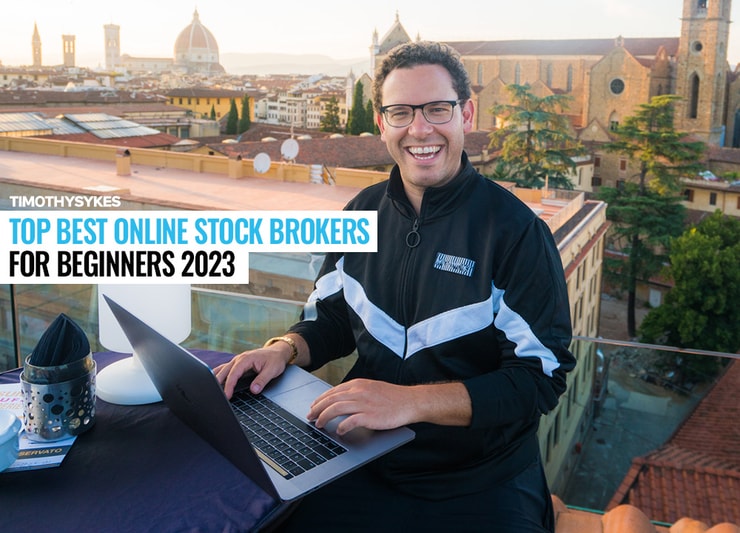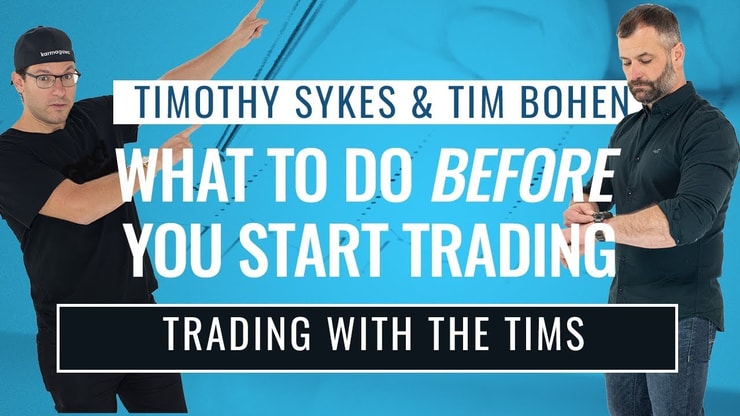Online stock brokers provide the platform, tools, and resources you need to start trading stocks, bonds, ETFs, and other investment options. These firms provide access to different products and markets…
More importantly, their sites and mobile apps have different performance in buying and selling stocks. As a trader, that’s what makes you profitable!
It’s a lot for a beginner to take on. With so many brokers out there, how do you choose the right one for you?
I’ve been teaching for over a decade, and this is one of the questions I get most often. In my experience, the answer is different for every trader…
This guide will walk you through the top online stock brokers for beginners in 2023, what to consider when choosing a broker, and how to get started. Let’s dive in!
Table of Contents
What Is an Online Stock Broker?

An online stock broker is a firm that executes buy and sell orders for stocks and other securities on behalf of its clients. These brokers provide a platform where investors can trade a variety of financial products, including stocks, bonds, ETFs, and options. They also offer a range of services and tools to help investors make informed trading decisions.
Choosing the right online stock broker is a crucial step in your trading journey. It’s not just about the platform and tools they provide, but also about the additional services they offer. For instance, some brokers offer excellent options for retirement planning, such as IRA accounts. If you’re interested in setting up an IRA, you might want to explore some of the best IRA accounts available. Remember, the right broker can make a significant difference in your trading experience.
Who Are Beginner Investors?
Beginner investors are people who are new to the world of investing. They may have limited knowledge of the stock market and investing principles.
Beginner investors often start with a small amount of money and aim to grow their portfolio over time. They typically benefit from brokers that offer educational resources, easy-to-use platforms, and strong customer service.
As a beginner investor, it’s essential to understand the basics of trading. However, it’s equally important to familiarize yourself with different types of investment accounts. For instance, Roth IRA accounts can be a great way to grow your investments tax-free. If you’re curious about how these accounts work, you can learn more about the best Roth IRA accounts here. Remember, knowledge is power when it comes to investing.
Why Use a Stock Broker?
Using a stock broker can provide several benefits for beginner investors. Brokers offer access to a wide range of investment options, from stocks and bonds to ETFs and options. They also provide trading platforms, research tools, and educational resources to help investors make informed trading decisions.
Additionally, brokers can offer services like portfolio management and financial advice.
Different Types of Brokers

There are several types of brokers, each catering to different needs and preferences.
More Breaking News
- Robinhood Appointed Trustee for Trump Accounts, Stock Rises
- Bitmine Immersion Technologies Secures Strategic Edge with $14 Billion Crypto Holdings
- Denison Mines Stock Surge Amid Strategic Developments
- Sezzle Inc. to Announce Q4 Results in Late February
Full-service Broker
Full-service brokers, like Morgan Stanley and Goldman Sachs, offer a wide range of services, including investment advice, portfolio management, and retirement planning. They provide a high level of personal service, with dedicated financial advisors who can help you develop a comprehensive investment strategy. However, this level of service comes at a cost, as full-service brokers typically charge higher fees than other types of brokers.
Discount Broker
Discount brokers, such as E-Trade and Interactive Brokers, offer fewer services but charge lower fees. They typically provide a trading platform, research tools, and educational resources, but they don’t offer investment advice or portfolio management. Discount brokers are a good choice for self-directed traders who prefer to manage their own investments.
Mobile Platforms
Mobile platforms, like Robinhood and Webull, allow you to trade on the go using your smartphone or tablet. They offer user-friendly apps with a range of trading tools and features. Mobile platforms are a great choice for traders who want the flexibility to trade anytime, anywhere.
Online Brokerages
Online brokerages, such as Fidelity and Charles Schwab, offer a balance of services and affordability. They provide a range of trading tools and resources, as well as access to a wide variety of investment options. Online brokerages are a good choice for both beginner and experienced traders.
Bank of America
Bank of America is a multinational investment bank that also offers brokerage services through its subsidiary, Merrill Edge. It provides a wide range of investment options, including stocks, bonds, ETFs, and mutual funds. With its seamless integration with Bank of America’s banking services, it’s a convenient option for those who already have accounts with the bank.
Considerations for Choosing the Right Broker for Beginners
When choosing a broker, there are several factors to consider. You might even have your own criteria, like credit cards offered…
Here are the big considerations.
Fees and Commissions
Fees and commissions are a crucial factor to consider when choosing a broker. These can include trading fees, account maintenance fees, and withdrawal fees. Some brokers, like Robinhood and Webull, offer commission-free trades, which can be a significant advantage for traders who make frequent trades.
Range of Investment Options and Educational Tools
The range of investment options a broker offers is another important factor. This can include stocks, bonds, ETFs, options, and more. Additionally, look for brokers that offer educational tools and resources to help you learn about trading and make informed decisions.
Some brokers offer retirement accounts, like IRAs, which can provide tax advantages for long-term investors. Additionally, some brokers offer fractional shares, which allow you to buy a portion of a stock instead of a whole share. This can be a great way to invest in high-priced stocks with a small amount of money.
Best Online Stock Brokers for Beginners

There are several online stock brokers that are well-suited for beginners.
These brokers offer user-friendly platforms, a wide range of investment options, and resources to help beginners learn about trading. These aren’t recommendations — they’re reviews of some of the strong points for each.
This list shouldn’t be the end of your search. Do your due diligence in everything market related, including choosing a broker…
With no account minimums the new standard, users aren’t limited to just one broker. Try as many as appeal to you so you can get that valuable firsthand experience!
TD Ameritrade
TD Ameritrade is a well-established online broker that offers a wide range of investment options, including stocks, bonds, ETFs, and options. Their trading platform, thinkorswim, is highly regarded for its user-friendly interface and robust set of trading tools. TD Ameritrade also offers extensive educational resources, making it a great choice for beginner traders.
In late 2023, TD Ameritrade will be completely absorbed by Charles Schwab, which acquired the broker in 2020 and is now at the partnership stage. This means its trading platform will also be available to Schwab traders.
Charles Schwab
Charles Schwab is a reputable broker that offers a wide range of investment options, a user-friendly trading platform, and a wealth of educational resources. They also offer a variety of account types, including individual and joint accounts, retirement accounts, and custodial accounts.
E-Trade
E-Trade is another popular online broker known for its comprehensive trading platform and wide range of investment options. They offer a variety of tools and resources to help traders make informed decisions, including real-time market data, advanced charting tools, and a vast library of educational content.
Fidelity
Fidelity is a well-known broker that offers a wide range of investment options and a robust trading platform. They offer extensive research tools and educational resources, making it a good choice for beginner traders. Fidelity is also known for its strong customer service and low fees.
Interactive Brokers
Interactive Brokers is a broker that caters to active traders with its advanced trading platform and wide range of investment options. They offer competitive pricing with low commissions, making it a good choice for traders looking to keep costs down. However, their platform may be a bit complex for absolute beginners.
Robinhood
Robinhood is a mobile-first broker that has gained popularity for its commission-free trades and user-friendly platform. It’s a great choice for beginners who prefer to trade on the go. However, it lacks some of the advanced research tools and investment options offered by other brokers.
Webull
Webull is another mobile-first broker that offers commission-free trades. They offer a range of investment options, including stocks, ETFs, and options. Their platform includes advanced charting tools and real-time market data, making it a good choice for traders who want a balance of simplicity and functionality.
Ally Invest
Ally Invest is an online broker that offers a wide range of investment options and a user-friendly platform. They offer competitive pricing and a variety of tools and resources to help traders make informed decisions. Ally Invest is also known for its strong customer service.
What Do I Need to Open a Brokerage Account?

To open a brokerage account, you’ll need to provide some personal information, such as your name, address, and Social Security number. You’ll also need to fund your account, either by transferring money from a bank account or by depositing a check.
Opening a brokerage account is a straightforward process, but it’s important to choose the right platform for your trading needs. Some platforms are more user-friendly and offer better tools for beginners.
If you’re looking for a platform that suits your needs, you might want to check out this list of the best stock trading apps. The right platform can make your trading experience smoother and more efficient.
Opening Brokerage Accounts
Opening a brokerage account is a straightforward process. First, you’ll need to provide some personal information, such as your name, address, and Social Security number. Next, you’ll need to choose the type of account you want to open. This could be a standard brokerage account, a retirement account, or a margin account. Once you’ve chosen the type of account, you’ll need to fund it. This can typically be done by transferring money from a bank account, depositing a check, or through a wire transfer.
Opening IRA Accounts
Opening an IRA account is similar to opening a brokerage account, but there are some additional steps involved. First, you’ll need to decide whether you want to open a traditional IRA or a Roth IRA. Each has its own tax advantages and eligibility requirements. Once you’ve chosen the type of IRA, you’ll need to provide some additional information, such as your employment status and income. After that, you can fund your account and start investing.
Key Takeaways

Choosing the right broker is a crucial step in your trading journey. The best broker for you depends on your individual needs and goals. Consider factors like the broker’s trading platform, investment options, fees, and customer service when making your decision.
Trading isn’t rocket science. It’s a skill you build and work on like any other. Trading has changed my life, and I think this way of life should be open to more people…
I’ve built my Trading Challenge to pass on the things I had to learn for myself. It’s the kind of community that I wish I had when I was starting out.
We don’t accept everyone. If you’re up for the challenge — I want to hear from you.
Apply to the Trading Challenge here.
Trading is a battlefield. The more knowledge you have, the better prepared you’ll be.
Have you chosen a broker yet? Let me know in the comments — I love hearing from my readers!





Leave a reply